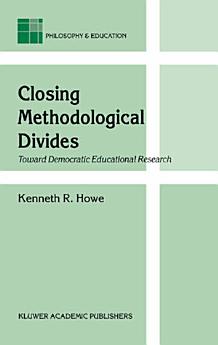Closing Methodological Divides: Toward Democratic Educational Research
кра 2006 · Philosophy and Education Кніга 11 · Springer Science & Business Media
Электронная кніга
157
Старонкі
reportАцэнкі і водгукі не спраўджаны Даведацца больш
Пра гэту электронную кнігу
The issues I treat in this book—qualitative versus quantitative methods, facts versus values, science versus politics, subjectivity versus objectivity, postm- ernism versus pragmatism, to name a few—are at the core of a lively, sometimes divisive, conversation that has been unfolding in the theory and practice of e- cational research for some time. These issues fall squarely within the province of philosophy, and thus philosophical investigation has an especially useful contribution to make. But these issues are by no means the exclusive province of philosophy; they are ones in which a diverse group of educational theorists have had a keen interest and about which they have had important things to say. The conversation I hope to join—and to move forward—is this broad and inclusive one. Philosophy of education is at its best when it dives headlong into the fray. The book borrows liberally from my previously published work, but is far from a simple compilation. The ideas developed in Chapter 7, “On the Threat of Epistemological Bias,” are new. The ideas developed in Chapter 9, “Toward Democratic Educational Research,” are a significant extension of the application of similar ideas to evaluation research. The ideas developed in Chapter 4, “The Persistence of the Fact/Value Dogma,” are in a form and at a level of detail not published before. Finally, Chapter 1, “Introduction and Overview,” weaves together my thinking on a large array of issues on educational research methodology that had only been loosely connected before.
Ацаніце гэту электронную кнігу
Падзяліцеся сваімі меркаваннямі.
Чытанне інфармацыb
Смартфоны і планшэты
Усталюйце праграму "Кнігі Google Play" для Android і iPad/iPhone. Яна аўтаматычна сінхранізуецца з вашым уліковым запісам і дазваляе чытаць у інтэрнэце або па-за сеткай, дзе б вы ні былі.
Ноўтбукі і камп’ютары
У вэб-браўзеры камп’ютара можна слухаць аўдыякнігі, купленыя ў Google Play.
Электронныя кнiгi i iншыя прылады
Каб чытаць на такіх прыладах для электронных кніг, як, напрыклад, Kobo, трэба спампаваць файл і перанесці яго на сваю прыладу. Выканайце падрабязныя інструкцыі, прыведзеныя ў Даведачным цэнтры, каб перанесці файлы на прылады, якія падтрымліваюцца.










